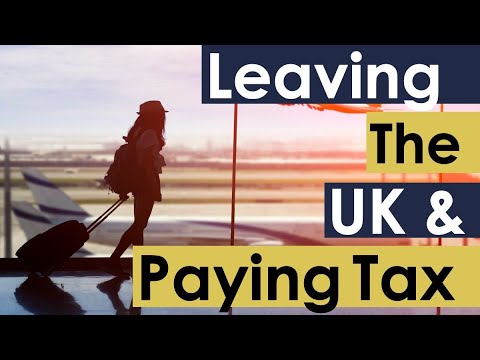If you’re thinking about leaving UK to live abroad, it’s important to understand the implications for your taxes. HM Revenue and Customs (HMRC) must be informed if you’re planning to permanently leave the country or work abroad full-time for at least one tax year. You have the responsibility to let HMRC know, and the process varies depending on whether you typically complete a self-assessment tax return or not. It’s crucial to be aware of the deadlines and penalties, and to understand how your residency status may affect your tax obligations. Additionally, you may need to consider National Insurance payments and how your departure may impact any UK benefits you are entitled to.
Tax obligations when leaving the UK
If you are planning on leaving UK to live abroad permanently or to work abroad full-time for at least one full tax year, it is important that you inform HM Revenue and Customs (HMRC) of your departure. Notifying HMRC helps ensure that your tax affairs are in order and that you comply with your obligations as a taxpayer.
Informing HM Revenue and Customs (HMRC)
When leaving the UK, you must let HMRC know by either filling in a tax return or completing the necessary forms. However, if you are leaving the UK for holidays or business trips, there is no need to inform HMRC.
How to inform HMRC
The method of informing HMRC about your departure depends on whether or not you usually complete a Self Assessment tax return.
If you do not usually complete a Self Assessment tax return, there are two options for informing HMRC:
- If you have already left the UK, you can fill in form P85 online.
- If you have not yet left the UK, you can download and fill in form P85 offline. In addition, you will need to include Parts 2 and 3 of your P45 form, which you can obtain from your employer or Jobcentre Plus if you have been claiming Jobseeker’s Allowance.
If you usually complete a Self Assessment tax return, you can inform HMRC of your departure through your tax return. You will need to complete the ‘resident’ section (form SA109) and send it by post. It is important to note that HMRC’s online services cannot be used to inform them of your departure. If you prefer, you can also seek assistance from a professional, such as an accountant, or use commercial software to complete your Self Assessment tax return.
Self Assessment tax return
If you are leaving UK permanently or working abroad full-time for at least one full tax year, it is important to understand the implications for your tax return. Failure to meet the deadline can result in penalties. The deadline for sending your tax return by post is 31 October. Therefore, it is crucial to ensure that you are aware of the different tax obligations that may arise when leaving the UK.
Penalties for not meeting the deadline
To avoid penalties, it is essential to meet the deadline for submitting your tax return. Failure to do so can result in fines imposed by HMRC. It is therefore important that you are aware of the deadline and ensure that you submit your tax return on time.
Notifying other agencies and organizations
In addition to informing HMRC, there may be other agencies and organizations that you need to notify about your departure from the UK. For example, you may need to inform your local council to stop paying Council Tax. It is important to check with the relevant organizations to ensure that you have fulfilled all necessary obligations and have a smooth transition when leaving the UK.
Tax implications for non-residents
As a non-resident, there are specific tax obligations and implications that you need to understand. Here are some important points to consider:
Non-residents and their tax obligations
As a non-resident, you are not required to pay UK tax on income or gains that you receive outside the UK. However, if you have UK income, you may be subject to UK tax. It is important to familiarize yourself with the rules and regulations regarding non-resident taxation to ensure compliance and avoid any unintended tax liabilities.
Exemption from UK tax on income and gains
If you are a non-resident, you are generally exempt from paying UK tax on income or gains that you receive outside the UK. This means that if you have income from other countries, you will not be subject to UK tax on that income.
Taxation of UK income for non-residents
If you are a non-resident and have UK income, such as rental income from a property in the UK, you may be required to pay UK tax on that income. It is important to understand the rules and regulations surrounding non-resident taxation to ensure you are compliant.
Double taxation agreements
The UK has entered into double taxation agreements with many countries to prevent taxpayers from being subject to tax on the same income in two different countries. These agreements aim to ensure that individuals are not taxed twice on the same income and that they are not at a disadvantage due to the difference in tax rules between countries. It is important to check if there is a double taxation agreement between the UK and your country of residence to understand how it impacts your tax obligations.
National Insurance contributions
As a non-resident, you may have the option to pay National Insurance contributions if you plan to return to the UK or claim the State Pension later. However, if you leave the UK permanently, you cannot claim back any National Insurance contributions you have paid. It is important to understand the rules and regulations surrounding National Insurance contributions for non-residents to ensure compliance and make informed decisions about your contributions.
National Insurance contributions
National Insurance contributions are an important aspect of your financial responsibilities. Here are some key points to consider regarding National Insurance contributions:
Paying National Insurance contributions abroad
If you are planning to work abroad but intend to return to the UK or claim the State Pension later, you may be able to continue paying National Insurance contributions while you are abroad. It is important to understand the requirements and eligibility criteria for paying National Insurance contributions abroad to ensure compliance.
Claiming back National Insurance contributions
If you leave the UK permanently, you cannot claim back any National Insurance contributions you have made. However, the contributions you have paid may count towards benefits in the country you are moving to if there is a social security agreement with the UK. It is important to understand the rules and regulations regarding claiming back National Insurance contributions to ensure you are aware of your entitlements and limitations.
Social security agreements
The UK has social security agreements with various countries to ensure that individuals are not disadvantaged when it comes to social security benefits. These agreements aim to coordinate the social security systems of different countries and protect individuals’ rights to benefits. It is important to familiarize yourself with the social security agreement between the UK and your country of residence to understand how it may impact your National Insurance contributions and entitlements.
Claiming UK benefits while living abroad
If you are living in the EU, Iceland, Liechtenstein, Norway, or Switzerland, you may be able to claim certain UK benefits, such as Jobseeker’s Allowance. However, eligibility depends on the agreement between the UK and the country you are moving to. It is important to check the specific rules and regulations regarding claiming UK benefits while living abroad to ensure compliance and that you are aware of your entitlements.
Reporting changes in circumstances
It is important to inform HMRC if there are any changes in your circumstances while you are abroad. This includes changes such as moving house or changes in marital status. It is crucial to keep HMRC updated with your current information to ensure that you are complying with your tax and National Insurance obligations.
Visiting the UK
If you plan to visit the UK without becoming a resident again, it is important to understand the restrictions and implications. Here are some key points to consider:
Visiting the UK without becoming a resident
If you work full-time abroad, you can typically visit the UK for up to 90 days, as long as you work no more than 30 of these days. It is important to understand the rules and regulations surrounding visiting the UK without becoming a resident to ensure compliance with immigration and tax laws.
Restrictions on visiting the UK
While you can visit the UK without becoming a resident again, there may be restrictions and limitations based on immigration and tax laws. It is important to familiarize yourself with these restrictions to ensure compliance and to avoid any unintended legal issues.
Becoming a UK resident again
If you engage in new activities in the UK after leaving, such as starting a business or purchasing property, you may become a UK resident again. It is crucial to understand the rules and regulations regarding residence status to determine how your activities in the UK may impact your residency status.
Checking residence status
If you are unsure how your activities in the UK affect your residence status, it is advisable to check with the relevant authorities or seek professional advice. Understanding your residence status is crucial for ensuring compliance with tax and immigration laws.
Conclusion
In conclusion, when leaving the UK to live abroad, it is essential to inform HM Revenue and Customs (HMRC) of your departure to comply with your tax obligations. Understanding the tax implications for non-residents, National Insurance contributions, visiting the UK, and related content can help ensure smooth transitions and compliance with the relevant laws and regulations. Additional resources are available for further information and guidance on specific situations.


